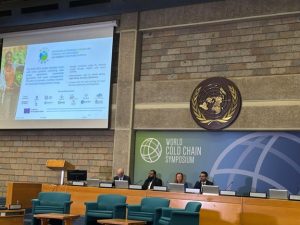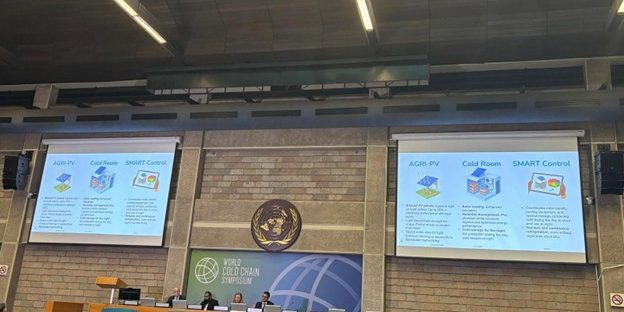Nairobi, Kenya – 1 November 2025 — The World Cold Chain Symposium (WCCS) convened global experts, industry leaders, and policymakers at the UNEP Headquarters in Nairobi, ahead of the 37th Meeting of the Parties to the Montreal Protocol.
Organised by the Global Food Cold Chain Council (GFCCC) in partnership with UNEP OzonAction and Carrier, this year’s theme, “Energizing the Private Sector”, underlined the transformative potential of public-private collaboration in building sustainable cold chains.

Marco Duran, Head of Policy and International Partnerships for the International Institute of Refrigeration (IIR) participate on Session 3, dedicated to “Sustainable Technologies”.
He presented the audience with the results achieved by the SophiA4Africa which was completed last September and introduced the proposition and ongoing activities under the AGRI-COOL project. These initiatives, funded by the European Union, developed through consortiums of African and European research centres and industry partners, bring innovative and sustainable container solutions to strengthen the health and food cold chains.
When referring to the Agri-cool technologies, Marco highlighted the benefits of using bifacial PV panels, which capture light on both sides generating up to 20% more electricity than a conventional panel, while enabling crops to grow under the panel. He also referred to the cold room solution equipped with overnight cold storage, humidity management and smart controls to ensure the continuity of controlled conditions.
In his conclusion, he emphasised the importance of applied research to develop tailored solutions that respond to the needs of the local communities where the projects are implemented, as well as developing the skills through exchange between consortium partners, and the training sessions organised by the programmes.
The event featured three more session, each addressing critical dimensions of cold chain development:
Session 1: Expanding Cold Chain Opportunities
A roundtable about the intersection of environmental policy, energy access, and economic development. The discussion underlined the importance of cross-ministerial collaboration, regulatory approaches that support innovation, and the transition to public-private partnerships to drive investment to scale up the solutions.
Session 2: Early Success – Programs That Are Working
This panel showcased successful initiatives from organisations such as WWF, DanChurchAid, and UNIDO, highlighting models that integrate solar-powered systems and revolving funds. Discussions focused on the shift from grant-based support to blended finance and pay-per-use models, aiming to de-risk investments and empower local actors.
Session 4: Search for Scalable Projects
The final session featured presentations from emerging ventures such as KK Fresh Produce Exporters, IKIC Impact Ventures, and KIVU Cold Group, showcasing promising projects ready for investment. The discussion reinforced the importance of building a robust pipeline and connecting innovators with financing.
The symposium concluded with a keynote and closing remarks, followed by a networking reception, leaving participants with better tools to drive cold chain solutions globally.










